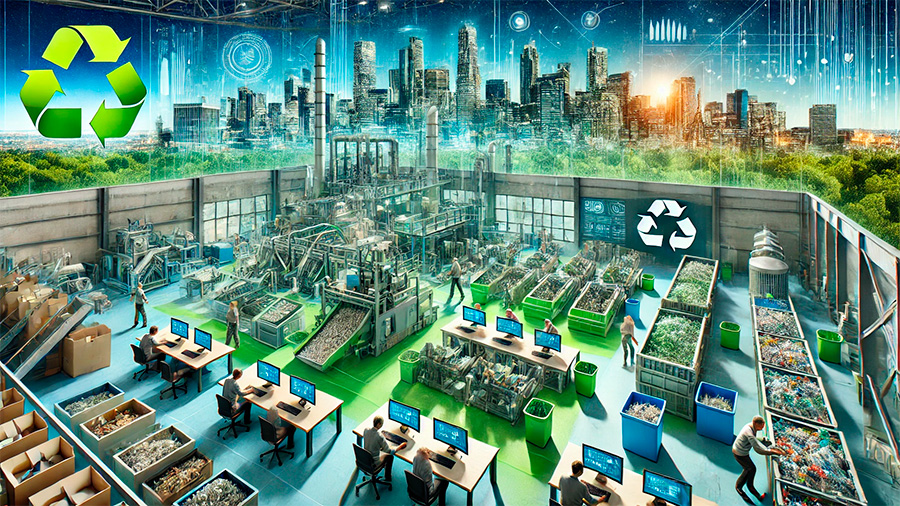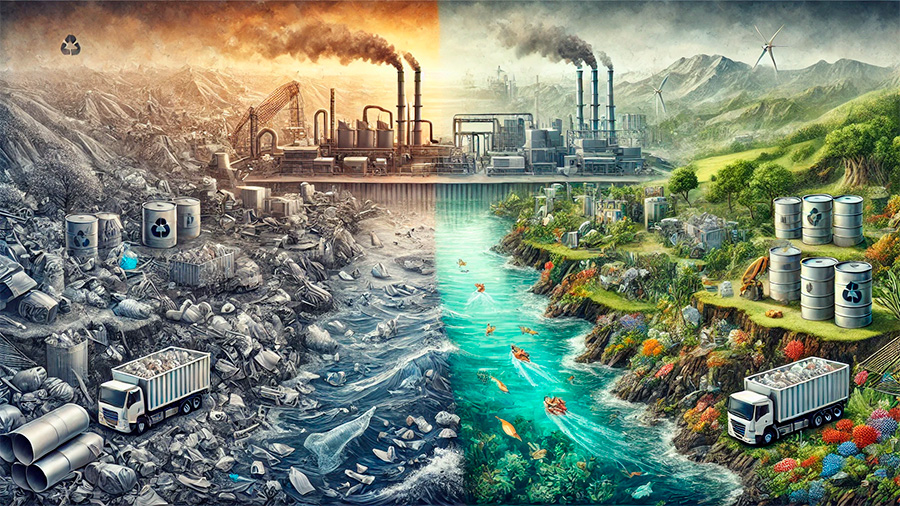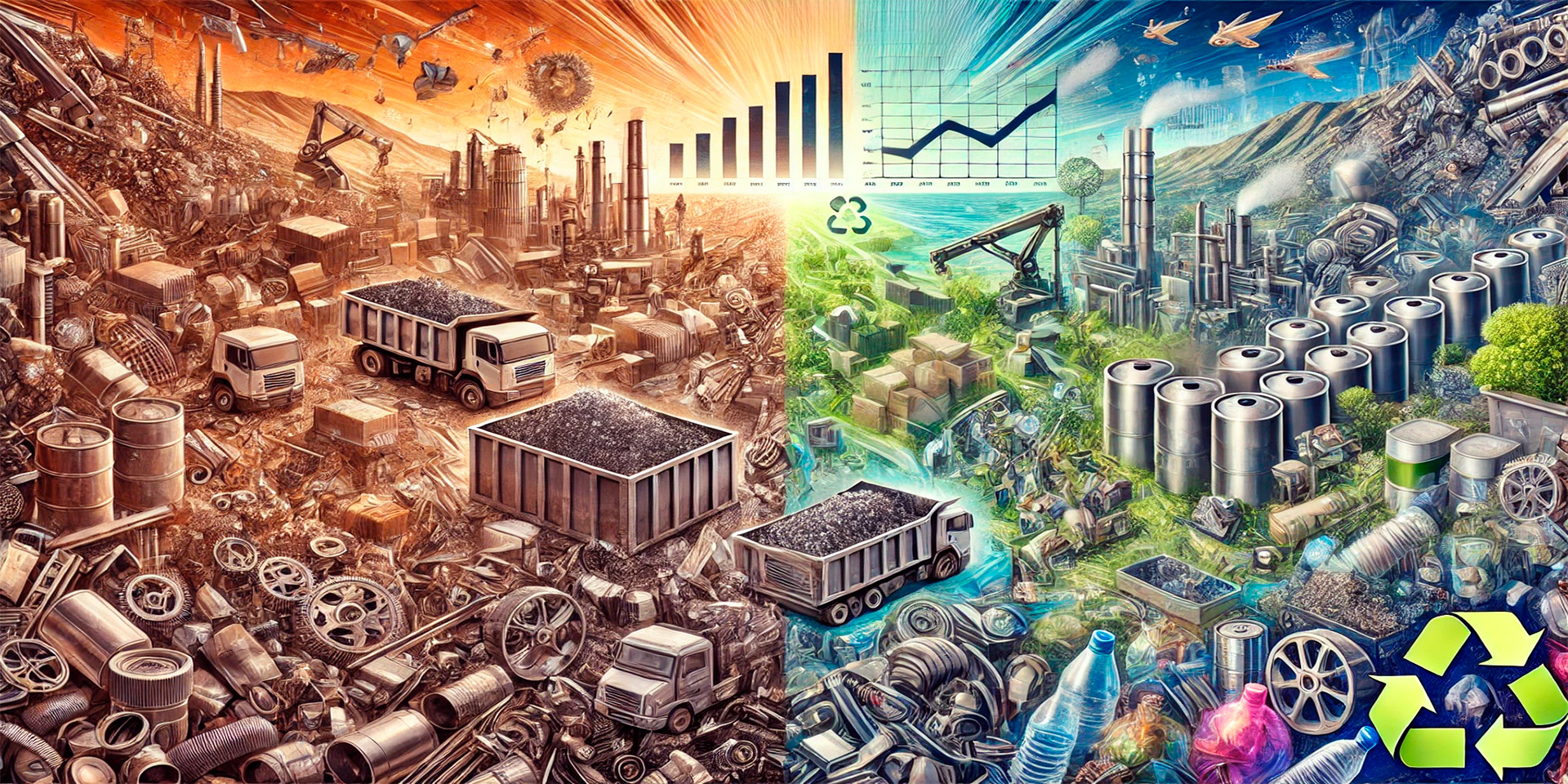Recycling has evolved from a niche environmental effort into a significant economic sector with vast potential for growth. As the world faces increasing challenges related to resource scarcity and environmental pollution, the recycling of metals and plastics has become not only an environmental necessity but also a driver of economic growth. Recycling industries contribute to GDP growth, create green jobs, and play a vital role in addressing the global pollution crisis. This article explores the economic benefits of recycling metals and plastics, highlighting how these industries are reshaping economies while promoting sustainability.
The Role of Recycling in Economic Growth
Recycling is no longer just about waste management; it is an integral part of the modern economy. By recovering valuable metals and plastics from discarded materials, recycling industries help conserve natural resources, reduce waste, and create new economic opportunities. These industries play a key role in reducing the need for virgin raw materials, which not only saves energy but also lowers production costs and reduces environmental harm.
1. Contribution to GDP Growth
The recycling industry contributes significantly to national and global GDP by generating revenue from the collection, processing, and resale of recycled materials. By transforming waste into reusable resources, recycling creates a closed-loop economy that promotes sustainable production and consumption patterns. The sector’s impact on GDP is seen through the direct economic activity generated by recycling facilities, the creation of jobs, and the reduction of costs in industries that rely on raw materials.
How recycling contributes to GDP growth:
- Job creation: The recycling industry provides millions of jobs worldwide, ranging from collection and sorting to processing and innovation. These green jobs offer new career opportunities while reducing unemployment and boosting economic activity.
- Increased manufacturing efficiency: By supplying manufacturers with recycled materials like metals and plastics, the recycling sector reduces the need for expensive raw materials, lowering production costs and enhancing overall economic efficiency.
- Revenue generation: The sale of recycled metals, plastics, and other materials creates significant revenue streams for recycling companies and boosts the economies of regions involved in recycling operations.
2. Stimulating Innovation and New Markets
Recycling industries drive innovation by encouraging the development of new technologies for the collection, processing, and repurposing of materials. Advances in recycling technology, such as more efficient sorting systems and methods to reclaim harder-to-recycle materials, open up new markets and opportunities for business growth. These innovations not only improve recycling efficiency but also make previously non-recyclable materials economically viable, creating new business models and increasing market opportunities.
Recycling and innovation in the economy:
- New technologies: Companies are investing in the development of advanced recycling technologies, such as chemical recycling, which allows for the recycling of mixed plastics and other complex materials.
- Emerging markets: The demand for recycled materials has created new markets for products like recycled metals, plastics, and textiles, opening up new business opportunities and increasing trade activity.
- Energy savings: By recycling metals like aluminum and copper, which require less energy to process than virgin materials, industries can cut energy costs, further promoting economic growth in the manufacturing sector.

Creating Green Jobs and Supporting Sustainable Development
One of the most significant benefits of the recycling industry is its ability to create green jobs—employment opportunities that focus on sustainable practices and environmental conservation. These jobs not only reduce unemployment rates but also contribute to a cleaner, more sustainable economy. From recycling facility workers and environmental engineers to researchers and policy analysts, the recycling industry supports a wide range of careers that help drive the transition toward a circular economy.
1. Job Creation in the Recycling Industry
The recycling industry is a labor-intensive sector that requires a skilled workforce to manage operations, handle materials, and drive innovation. By expanding the recycling infrastructure, governments and businesses can generate a substantial number of jobs that contribute to the local economy. Green jobs in the recycling sector also offer individuals the opportunity to work in industries that support environmental sustainability, providing workers with a sense of purpose and long-term career prospects.
Job opportunities in recycling:
- Recycling collection and sorting: Jobs related to the collection, sorting, and processing of recyclable materials create employment in communities, particularly in urban and industrial areas.
- Research and development: New methods of recycling and waste management require highly trained researchers and engineers to design, test, and implement innovative recycling technologies.
- Policy and regulation: Government agencies and non-governmental organizations play a critical role in shaping recycling policies and regulations, creating jobs in environmental advocacy, regulation, and policy analysis.
2. Supporting Sustainable Development Goals (SDGs)
Recycling is a key pillar in achieving many of the United Nations’ Sustainable Development Goals (SDGs). By reducing the reliance on virgin raw materials, recycling helps conserve natural resources, reduce waste, and lower the carbon footprint of industries. This supports the transition to a more circular economy, where resources are reused, repaired, and recycled rather than discarded, contributing to environmental protection and sustainable economic growth.
How recycling contributes to SDGs:
- Responsible consumption and production (SDG 12): Recycling reduces the environmental impact of production by lowering the demand for new raw materials and decreasing the volume of waste generated.
- Affordable and clean energy (SDG 7): By recycling metals like aluminum, which require less energy to process than virgin materials, recycling contributes to energy savings, making energy use more sustainable.
- Climate action (SDG 13): Recycling reduces greenhouse gas emissions by minimizing the energy required for raw material extraction and processing, thereby helping mitigate climate change.

Recycling Metals and Plastics: Addressing Global Pollution
In addition to its economic benefits, the recycling industry plays a crucial role in tackling one of the world’s most pressing challenges—pollution. Metals and plastics, particularly when not properly disposed of, contribute to global pollution and waste problems. Recycling these materials helps reduce landfill waste, conserves natural resources, and prevents harmful substances from polluting the environment.
1. Reducing Plastic Waste and Ocean Pollution
Plastic waste has become one of the most visible forms of pollution, with millions of tons of plastic entering the oceans each year. The recycling of plastics can significantly reduce the amount of waste that ends up in landfills and oceans, helping to curb environmental damage. The development of more efficient plastic recycling technologies also ensures that plastic materials are reused, lowering the demand for new plastic production and reducing overall environmental impact.
Recycling and plastic pollution:
- Reducing landfill waste: By recycling plastics, we can divert millions of tons of waste from landfills, reducing pollution and conserving space.
- Preventing ocean pollution: Recycling plastic materials prevents them from ending up in the oceans, where they can harm marine life and ecosystems.
- Innovation in plastic recycling: Advances in chemical recycling technologies are helping break down complex plastics that were previously non-recyclable, opening new opportunities for plastic recovery.
2. Conserving Natural Resources and Reducing Mining Impacts
Recycling metals like aluminum, copper, and steel reduces the need for mining, which is a resource-intensive process that often results in environmental degradation. By recycling metals, we can conserve valuable natural resources, reduce energy consumption, and minimize the environmental impact of mining operations. This is particularly important as the demand for metals continues to grow with the rise of renewable energy technologies and electronic devices.
How recycling metals helps reduce environmental impact:
- Lowering energy consumption: Recycling metals like aluminum requires 95% less energy than mining new aluminum, significantly reducing greenhouse gas emissions and conserving energy.
- Reducing habitat destruction: Recycling metals reduces the need for mining, helping to preserve natural habitats and ecosystems.
- Decreasing pollution: Recycling metals reduces the air and water pollution associated with mining and refining processes.
Conclusion
The economic potential of recycling metals and plastics is immense. Not only does recycling contribute to GDP growth and create green jobs, but it also plays a vital role in addressing global pollution and supporting sustainable development. By embracing recycling, economies can reduce their dependence on finite natural resources, minimize waste, and create a more sustainable future. The ongoing innovation in recycling technologies offers new opportunities for growth and environmental stewardship, making recycling a cornerstone of both economic and environmental resilience.


